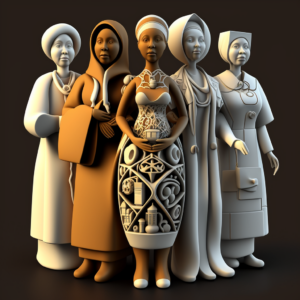As healthcare providers, nurses play a critical role in promoting cultural competence and diversity in patient care. Cultural competence refers to the ability of healthcare providers to understand, respect, and respond to the unique cultural beliefs, values, and practices of their patients. Diversity in healthcare encompasses differences in race, ethnicity, religion, sexual orientation, gender identity, socioeconomic status, and other factors that may impact the health and well-being of patients.
In today’s increasingly diverse society, cultural competence and diversity are essential strategies for promoting high-quality patient care. By understanding and valuing the diverse backgrounds and experiences of their patients, nurses can provide more effective and personalized care that meets the unique needs of each individual.
 In order to promote cultural competence and diversity in nursing practice, it is important to first understand the concepts of culture and diversity. Culture refers to the shared beliefs, values, behaviors, and customs that characterize a particular group of people. Diversity encompasses differences in race, ethnicity, religion, sexual orientation, gender identity, socioeconomic status, and other factors that may impact the health and well-being of patients.
In order to promote cultural competence and diversity in nursing practice, it is important to first understand the concepts of culture and diversity. Culture refers to the shared beliefs, values, behaviors, and customs that characterize a particular group of people. Diversity encompasses differences in race, ethnicity, religion, sexual orientation, gender identity, socioeconomic status, and other factors that may impact the health and well-being of patients.
One key aspect of cultural competence is self-awareness and reflection. By understanding their own cultural background and biases, nurses can better appreciate the cultural perspectives of their patients. This self-awareness is critical for avoiding stereotypes and prejudices, and for providing culturally sensitive care and communication.
To further develop their cultural competence, nurses should seek out education and training in this area. This can include workshops, online courses, and reading materials that focus on cultural competence and diversity in healthcare. Building relationships with diverse patients and communities can also be a valuable way to gain a deeper understanding of the unique needs and perspectives of different cultural groups.
In the workplace, nurses can apply their cultural competence by respecting the cultural beliefs, values, and practices of their patients. This can involve being open to learning about new cultural practices and traditions, and incorporating these considerations into treatment and care plans. Nurses should also strive to provide culturally sensitive care and communication, avoiding stereotypes and prejudices, and taking the time to understand the unique perspectives and needs of each patient.
However, there are also challenges and barriers to cultural competence in healthcare. Personal biases and attitudes can sometimes get in the way of providing culturally competent care. Additionally, the lack of cultural diversity in the healthcare workforce can be a barrier to promoting cultural competence, as there may be limited opportunities for learning and growth in this area. Finally, there may be systemic barriers to cultural competence in healthcare, such as policies and procedures that do not fully embrace the importance of cultural diversity.
In conclusion, cultural competence and diversity are essential strategies for promoting high-quality patient care in nursing practice. By understanding the concepts of culture and diversity, developing cultural competence, and applying cultural competence in the workplace, nurses can provide more effective and personalized care that meets the unique needs of each individual. Ongoing education, training, and self-reflection are critical for promoting cultural competence in nursing practice and for overcoming the challenges and barriers to this important goal.

